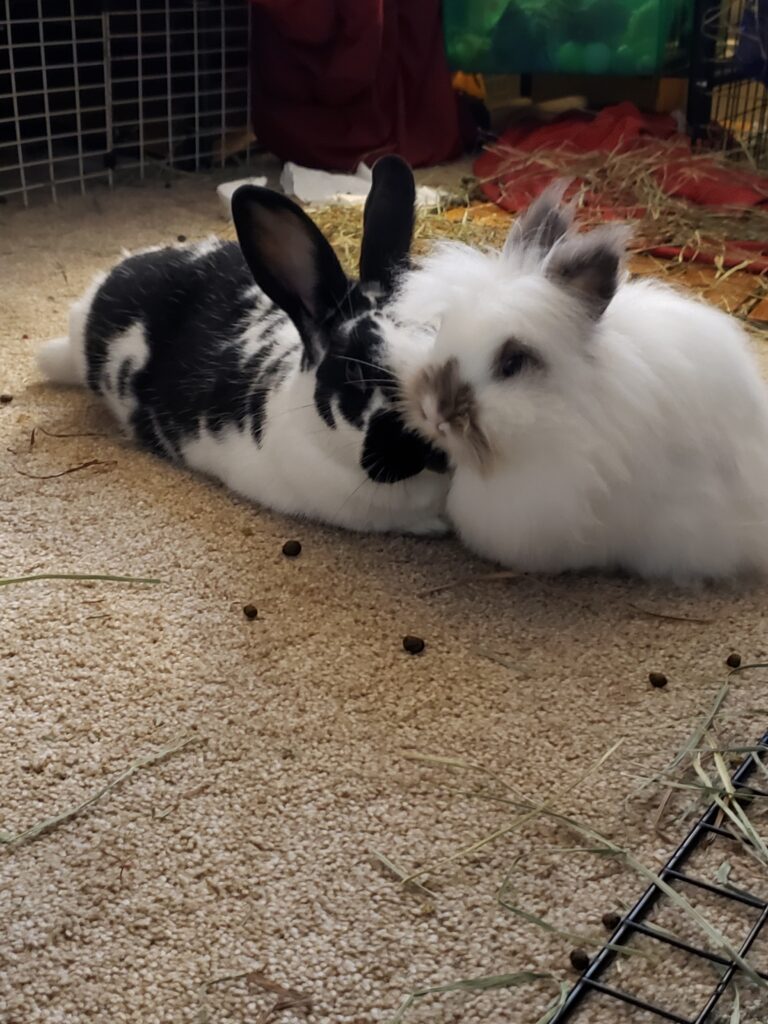Easter is just around the corner! In the spirit of the holiday, we decided to talk about some of our favorite pets here at All Creatures– rabbits!
All about Rabbits
Rabbits are mammals, just like humans, dogs and cats. Surprisingly, they are not rodents, but lagomorphs! Rabbits are herbivorous, eating mainly grasses in the wild, but do enjoy various vegetables and flowers. The pet rabbit is a dependent of the European rabbits– just like dogs, we now have many breeds. In a home with good care, they can live to be 10 years old, or even older!
Considering Getting your own Easter Bunny?
Baby rabbits, or kits, are born blind and deaf, similar to cats and dogs. If you are looking to adopt or purchase a baby rabbit, please do not get one before they are 8 weeks old, they need to be with their mothers until that time. Once baby rabbits are weaned, they can be on alfalfa hay until they are 6 months old. They should also be fed as many pellets as they want to eat! You should slowly introduce new types of vegetables to their diets, particularly leafy greens (e.g. lettuce (not iceberg), bok choy, kale, dandelion greens, etc.). Add in one new type of green per week until they have a large variety.
After 6 months old, rabbits can be fed a diet of mostly hay, but no more alfalfa! Timothy, orchard grass, oat, etc. are all acceptable types of hay for adult bunnies; and many appreciate some variety. Rabbits should always have hay available. Pellets should be reduced to 1-2 tbs. per 5 lbs. of body weight daily and 1 cup of greens daily per 2 lbs. of body weight.
Rabbits make great pets– but not easy ones! They can live indoors or outdoors; but if outdoors, they need a good hutch to keep them warm or cool as needed. If indoors, they will need a place to live (either a cage or an x-pen) with hay, water, and a litter box (yes! They can be litter box trained!). Rabbits are messy animals, and their hay may be tracked all throughout their area. Be prepared to vacuum frequently! They will require exercise out of their cages, however. Rabbits will chew chords and baseboard if you are not careful; you may have to ‘bunny-proof’ a room for them. If socialized regularly, they can become quiet the snuggly pet. Most do not like being held for long periods of time, but many love head scratches and long petting sessions. When happy, rabbits will ‘flop’ their hind limbs out when sleeping and binky when excited (kick their legs out and jump through the air). They are most active at sunrise and sunset, so keep an eye out.
Common Problems
Generally, rabbits are hardy pets. The most common problem with pet rabbits is called GI stasis. This can occur due to stress, eating things they should not be eating, and an improper diet. These rabbits will stop eating and pooping; this is an emergency! Please call a veterinarian right away if you notice this. Your veterinarian will likely recommend fluids, pain medication, and possibly blood work and x-rays to rule out more sinister problems.
Reproductive disorders are also a common problem in rabbits, especially females. Female rabbits are very prone to cancer of the uterus and ovaries. The best treatment is prevention! Spaying your rabbit will prevent uterine or ovarian cancer, and will help reduce the risks of mammary cancers. Male rabbits are less likely to have problems, but can spray and become territorial if left intact.
Dental disease can happen in any rabbit, especially one without enough hay in the diet! Rabbits have teeth that grow forever, slightly faster than our finger nails. If the top and bottom teeth do not align correctly, they can grow into sharp points and cause pain. Hay helps them to grind these points down and prevent problems from occurring, especially in the back teeth. Sometimes even hay is not enough; your veterinarian may need to sedate your rabbit to file down his or her teeth if that is the case.
Long haired rabbits are prone to matting of the fur and any rabbit can get hair balls. Unfortunately rabbits cannot vomit, so hairballs can be dangerous. The best prevention is simply brushing your rabbit, which they often enjoy.
A contagious disease common in rabbits to watch out for is called E. cuniculi. This is a parasitic infection transmitted in the urine of infected rabbits. It is highly contagious between individuals. This disease often causes no clinical signs for long periods of time and then suddenly with surface. Clinical signs include cataracts, head tilt, seizures, and even sudden death. Treatment includes anti-inflammatories, antibiotics, anti-parasitics, and sometimes even hospitalization. These rabbits are rarely cured, but can sometimes be managed long term. There is a blood test for E. cuniculi; if you are worried about your new pet, ask a veterinarian about the test!
Veterinary Care
Some veterinarians do not see rabbits, so before you bring your new friend home, find a rabbit savvy veterinarian. Rabbits, like dogs and cats, should be seen by a veterinarian every 6 months to ensure good health and monitor their teeth. Your veterinarian can also recommend any dietary changes, habitat adjustments, and other ways to improve your bunny’s home life. She may also recommend blood work, even when healthy, to ensure there is nothing going on we cannot see.









